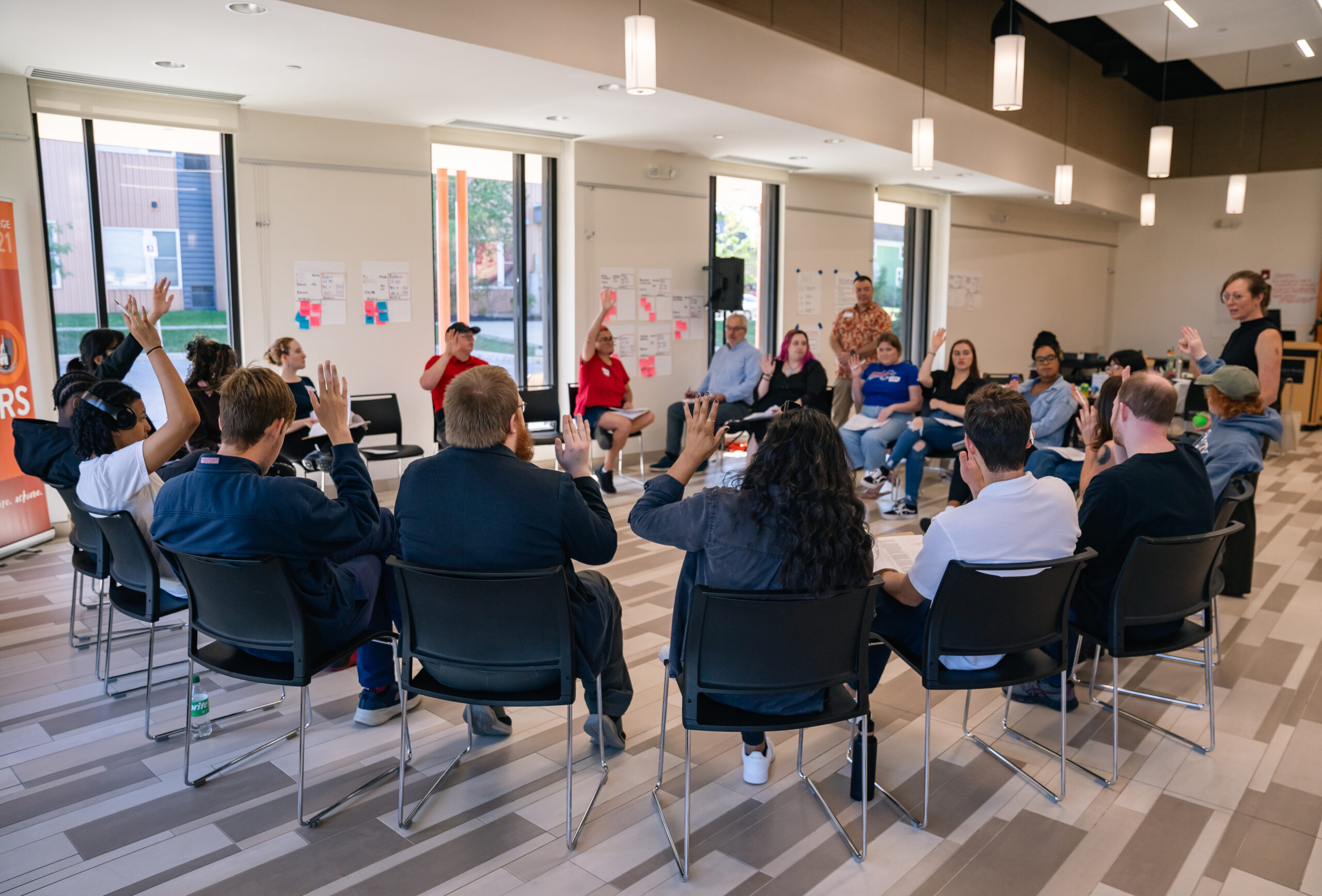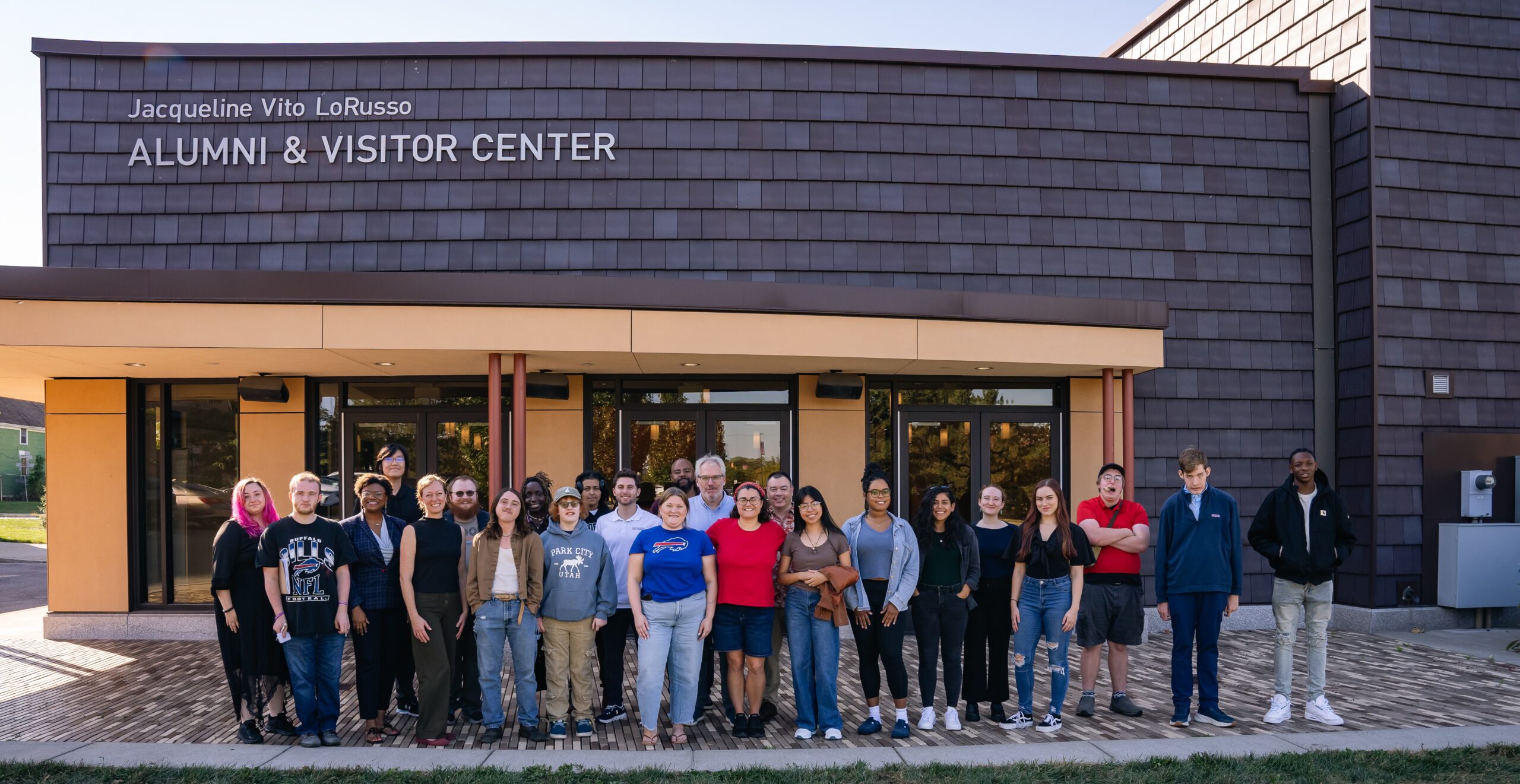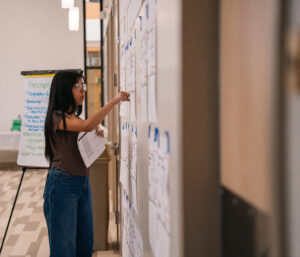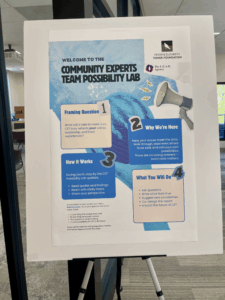In a Buffalo State University Alumni and Visitor Center conference room, young leaders from across Western New York and Eastern Massachusetts gather in a circle. The walls around them are lined with colorful posters capturing notes, reflections, and reminders from months of meetings: listen first, respect all voices, make room for difference.

These youth, all with different abilities and lived experiences connected to mental health challenges, substance use disorder, learning disabilities, and intellectual disabilities, make up the Community Experts Team (CET) — a group of 15 youth and young adults–who design the grantmaking process and decide how $350,000 in grants will be awarded. Each member enters with insights shaped by their own journey. Some bring notepads filled with reflections; others tap through digital notes on tablets. They begin their deliberations — not by debating budgets, but by asking questions that reveal the soul of the work:
Who will feel seen if this program is funded?
Which proposal builds community, not just capacity?
What will change if we invest here — and who will benefit?
As the conversation deepens, equity becomes not a checklist but a practice. “I came in feeling like I had to prove I belonged,” one participant quietly says. “Now, I know my story is expertise.”
In that moment, power is shared — and possibility is realized.
From Inclusion to Shared Power
The Peter & Elizabeth Tower Foundation is a family foundation supporting young people with intellectual disabilities, learning disabilities, mental health challenges, and substance use disorders. For years, the Foundation focused on relational, trust-based grantmaking. Yet in 2019, staff began asking: What would it look like if young people with lived experience not only advised, but decided?
The answer took shape as the Community Experts Team (CET) — a participatory grantmaking model that moves beyond inclusion to shared power. Each year, CET members build a strong, inclusive team, co-design an RFP, review and score proposals, and convene for a retreat to award funding.
For many years, professional and organizational voices shaped Foundation strategy and direction. While those perspectives are essential to good grantmaking, the Foundation came to understand that the insights of young people who have faced these challenges themselves are equally vital.
“I can remember one of the first times we had young people speak to the Foundation’s Board of Trustees about their experience reviewing grant applications. The Board was blown away by the thoroughness and thoughtfulness of the team’s review.”
— Tracy A. Sawicki, Executive Director, Peter & Elizabeth Tower Foundation
Over time, the Foundation found that proximity to people with lived experience deepened its own learning. Looking at standard practices and processes through this new lens contributes to grantmaking that feels more informed, more grounded in real-life perspectives.
Participatory grantmaking, in turn, became a mirror and a compass: reflecting the Foundation’s values and guiding its evolution. “I think the Community Experts Team is amazing for many, many reasons,” said Renata, a 2025 Community Expert, “but I think the biggest part being that, well, there’s no better person to tell the tale than the person who’s lived it.”
CET members receive stipends for their participation and referring organizations are compensated for their support. The Community Experts Fund itself has grown from $200,000 to $350,000, reflecting both the Foundation’s deepening commitment and the quality of the CET’s decisions.
What Made This Shift Possible

The Tower Foundation’s evolution toward participatory grantmaking was not accidental — it was built on intentional commitments that turned curiosity into culture, and inclusion into shared power.
The Foundation’s participatory work began with an exploration of human-centered design — documented as a case study in The Foundation Review. Human-centered design’s process of listening, iterating, and building feedback loops helped the Foundation map out a strategy for youth engagement with humility and a spirit of experimentation.
The Foundation’s understanding of diversity, equity, and inclusion deepened in parallel with its participatory grantmaking practice. CET members live intersectional lives — bringing multiple dimensions of identity, experience, and expertise. Their perspectives are now recognized as vital sources of knowledge that enrich decision-making.
Some of the Foundation’s most meaningful lessons have come from its grant partners — organizations that have long modeled youth leadership and equitable engagement. Their partnership and encouragement helped shape the Foundation’s own participatory journey.
“The more we trust the team, the more we learn about ourselves. This work stretches us — and that’s where growth happens.” – Megan MacDavey, Program Officer, Peter & Elizabeth Tower Foundation
Evolving Through Reflection and Adaptation
Most recently, the team has been asking, “How might we increase connection between team members?” Annual regional in-person meet-ups now bring together youth who largely meet virtually, deepening relationships and shared purpose.
These adaptations reveal a simple truth: there is no one “right way” to do participatory grantmaking. Progress comes through listening, feedback and courage to evolve. Moving gradually – from engaging youth as advisors to empowering them as autonomous decision-makers – allowed the Foundation to build both trust and institutional readiness.
“We’ve hit our stride in some ways with this work, but we’ve also learned to stay nimble,” MacDavey reflects. “Team members change, the world changes – and we adapt too.”
In practice, the Tower Foundation’s journey embodies the essence of Youth-Possible Philanthropy™: humility, reflection, and the courage to share power. It shows what’s possible when funders honor lived experience as expertise – and commit to transforming both systems and themselves in the process.
In 2025, the Foundation invited The L.E.A.D. Agency to serve as a learning partner and conduct a concurrent evaluation – capturing feedback and insights as the process unfolds rather than after it concludes. Their framework, Youth-Possible Philanthropy™, was already showing up in the CET’s design; it helped name and deepen what was in motion. This partnership has supported the Foundation in making real-time adjustments in facilitation, accessibility, and leadership support, ensuring that the work continues to evolve with integrity and care.
Reimagining What’s Possible: Why Youth-Possible Philanthropy™?
The Youth-Possible Philanthropy™ (YPP) framework offers a promising pathway — a reimagining of what’s possible when youth and philanthropy work in partnership to transform systems together.
YPP™ introduced by Dr. Kimberlin D. Butler in her peer-reviewed article “Engaging Youth in Philanthropic Practice: Field-Building Strategies and the Promise of Youth-Possible Philanthropy™” (The Foundation Review, Vol. 17, Issue 1, 2025), is a field-building framework that centers youth as partners in strategy, governance, and systems change. It brings together six interconnected elements that, when practiced together, shift philanthropy from inclusion to shared power:
YPP Element |
Definition |
How CET Demonstrates It |
| Youth Participatory Grantmaking |
Youth and lived-experience leaders have real decision-making power. |
CET members co-design the RFP, review applications, and decide how to allocate ~$350K annually. |
| Trust-Based Philanthropy (within YPP) |
Culture grounded in trust, transparency, learning, and mutual accountability. |
Tower Foundation shares power, invites community expertise, and builds reciprocal trust through open feedback and transparency; Community Grant Consultants (CGCs) bring community voice into core portfolio review. |
| Equity-Centered Approach |
Centered on historically resilient and excluded youth; addressing systemic inequities is a core goal. Equity and accessibility embedded throughout design. |
Grounded in the Tower Foundation’s ethos of equity, humility, and accessibility, CET integrates accommodations, neurodiversity supports, stipends, and intentional inclusion of differently-abled youth and young adults. |
| Multi-Sector Collaboration |
Cross-sector ecosystem of support, engagement and accountability. |
Referral, Support, and Review Partners connect schools, CBOs, disability service providers, and nonprofits to sustain equity across systems. |
| Participatory Learning |
Co-interpretation of data and shared reflection. |
The Possibility Lab and feedback loops where youth and staff interpret learning together in real time. |
| Possibility Development |
Philanthropy as a catalyst for leadership growth, social capital, and self-actualization. |
Alumni serve in staff, advisory, and board roles — turning participation into leadership and community influence. The Foundation commissioned a CET logo designed by a youth team member, investing directly in their creative skills and voice. |
These components create the conditions for possibility development — helping youth self-actualize as leaders, collaborators, and co-architects of change within their communities.
Through YPP™, the philanthropic sector itself becomes a civic engine — catalyzing youth and young adults into the leadership pipeline for equity and transformation across sectors. By creating space for youth in philanthropic investments, strategy, and governance, funders expand not only who leads, but how communities imagine and achieve progress that lasts.
Behind the Scenes: The CET in Practice

The CET was created to give young people with lived expertise the power to shape funding decisions — and the support to do so. From the start, equity is built into every step of the process: how team members are recruited, how decisions are made, and how the group is supported to lead with confidence and care.
CET members are invited to participate on two-year terms, each year adding new young people. New candidates are referred to the CET by organizations within the Foundation’s catchment area and complete an application and online interview with the Participatory Grantmaking Program Manager. CET members often work closely with Support Partners who assist with time management, transportation, or technology.
In a typical year, CET participation may look like this:
- from April to June the team establishes the focus of their RFP and to design the grant guidelines for prospective applicants.
- the team takes September to review grant applications and notifies applicants of decisions by mid-October.
Foundation staff stay deeply connected with team members (email, text messaging, Slack, phone, Zoom and virtual office hours) during the grant review period. Agendas, pre-readings, and videos are shared in advance to accommodate different learning styles, and meetings are recorded for those unable to attend.
The second half of the team’s engagement is focused on building the application review experience, from reflecting on implicit biases in decision making, to deciding how the team will review and score applications, to practicing the review of grant applications together.
CET members participate in the following: six monthly virtual working sessions, a regional in-person gathering, and a full-day, in-person grantmaking retreat in Buffalo, New York, followed by a final virtual celebration.
“When young people are trusted to lead and supported to do so, they step up: they take up space, share perspectives confidently, disagree respectfully, and collaborate thoughtfully. One moment that stood out at this year’s retreat was when a member made a thoughtful case for a proposal—then invited teammates with lived experience to weigh in. That balance of confidence and invitation is what shared power looks like in practice.” – Nissa Bisguier, Program Manager, Peter & Elizabeth Tower Foundation
When and How the CET Possibility Lab Fit Into the Process

The CET Possibility Lab—curated and facilitated by The L.E.A.D. Agency – was held during the in-person grantmaking retreat in Buffalo and designed as a bridge between reflection and co-creation, so youth could translate evaluation insights into concrete recommendations for CET’s next chapter.
- Gallery Walk & Mini “Data Walk” (~45 minutes, over lunch): Youth explored quotes and findings on equity, accessibility, participation, and leadership; added reactions on sticky notes; and identified patterns.
- Co-interpretation & Synthesis (~30 minutes, end-of-day): Whole-group sensemaking surfaced priorities to carry forward (e.g., specific accessibility supports, invitations to quieter voices, clarity on balancing RFP fit with community need).
“When participatory grantmaking is paired with participatory learning, something shifts. Youth aren’t just reviewing proposals—they’re shaping meaning, naming what matters, and charting where the strategy goes next. That is the heart of possibility development in philanthropy: creating the conditions for young people to see themselves—and be recognized by the field—as leaders of systems change, not just participants in a process.” – Dr. Butler, founder and Chief Possibility Catalyst of The L.E.A.D. Agency
The Lab ultimately turned data into dialogue—and dialogue into direction—modeling what it means to practice Youth-Possible Philanthropy™. By learning alongside youth rather than about them, the Tower Foundation and its partners show how learning itself can be a core equity practice that strengthens shared leadership across philanthropy.
Looking Forward: An Invitation to the Field
Philanthropy stands at a defining moment — one where inclusion is no longer enough, and shared power must become common practice. Youth-Possible Philanthropy™ shows that when youth are positioned as co-designers and decision-makers, the result is not only stronger grantmaking, but more just, resilient, and connected communities.
What would it look like if more foundations embraced these components — participatory grantmaking and learning, equity-centered leadership, multi-sector collaboration, and youth possibility development — as everyday practice?
Each step expands the circle of who leads, who learns, and who decides.
This work is not abstract. As an estimated $84 trillion in intergenerational wealth transfer reshapes the philanthropic landscape — including more than $9 trillion expected to flow through giving — historically resilient and excluded youth are uniquely positioned to lead. They bridge lived experience with strategic insight, catalyzing investments that transform communities and redefine the future of philanthropy.
We invite funders to embrace possibility—not as perfection, but as practice—answering a clarion call to trust and position youth as leaders in transforming the systems that shape their lives.

Nissa Bisguier joined the Foundation’s Community Experts Team in 2022, served as a team member reviewing grants, and in 2023 became Participatory Grantmaking Program Manager, guiding team members through the design of their RFP and review process while fostering an inclusive and equitable environment for all participants.


Megan MacDavey supports participatory grantmaking and youth engagement initiatives with a focus on equity and learning. She has played a key role in advancing the Foundation’s community-driven approach to philanthropy and fostering inclusive spaces for young leaders to shape decision-making.
